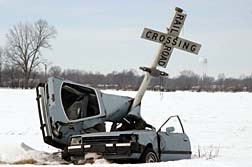 But there's another side to this that most people don't think about. It's something, which, tragically, you hear in the news all the time—and those are the incidents of death and traumatic injury that happen when a train hits a car or comes in contact with a pedestrian.
But there's another side to this that most people don't think about. It's something, which, tragically, you hear in the news all the time—and those are the incidents of death and traumatic injury that happen when a train hits a car or comes in contact with a pedestrian.In other words, accidents or suicides that do not directly involve rail workers. But they are affected just the same.
When FELA was enacted by Congress 100 years ago, our nation's forefathers would have been thinking specifically of the rail workers, or their families, who are directly impacted when something goes wrong on the tracks. Life on the railroad can, at times, be a dangerous business. Rail workers needed some form of legislated protection and assistance for when the unthinkable happens. A leg is crushed, a foot is lost, or a father goes to work one day and doesn't come home.
But what happens when someone, for reasons known only to him or her, determines that life is no longer worth living and lays down on the tracks just ahead of a speeding locomotive?
As tragic as it is, that has nothing to do with the rail line or the rail worker. The horrific accident that ensues directly affects the troubled individual and the friends and family left behind. As for the rail workers on board the train, or on the ground adjacent to the scene of the tragedy, there is little they can do to prevent such a tragedy from occurring, beyond standing by and watching helplessly as it unfolds.
Exactly. And any psychiatrist will tell you that simply witnessing such an event can, and does, have a lasting impact on a person's life.
There is little worse than the horrific feeling that goes along with the witnessing of such a tragic, horrific event while absolutely helpless to prevent it. Looking away perhaps removes the potential for a vivid memory that might haunt for the rest of someone's life. But it doesn't shield the witness from the sound, or the vibration of the impact, or the screams immediately prior.
Nor does it shield from the aftermath, which is unthinkable.
It has been determined that a train engineer who works for 25 years—not uncommon in the rail business—can expect to see at least 3 people die on the tracks during his career. And that's an average, according to a spokesperson for the Brotherhood of Locomotive Engineers and Trainmen (BLET), located in Washington.
There are those who will witness more, and the effects they have on train crews are devastating. "We have a higher rate of post traumatic stress," says John Tolman, Vice President of the BLET.
A spokesperson for a rail company in Massachusetts indicated that conductors and engineers who are witness to a suicide by train are routinely given three days off with pay, which allows them to obtain counseling. It was not known if the counseling is paid for by the rail line, but "we want to make sure that our employees are cared for," said Richard Davey, General manager of Massachusetts Bay Commuter Railroad (MBTA). "If they require more time, we are there to support them. It's a tragic circumstance for many people."
According to statistics from the Federal Railroad Administration, fatalities on MBTA tracks average 4 to 5, each year. It is not known what percentage of that number represents suicide vs. accidents, however the Centers for Disease Control and Prevention (CDC) in Atlanta estimate that there are 30 suicides by train each year in the US (regulators do not keep statistics on this subject).
That represents about 1 percent of the 30,000 suicides that occur each year in this country. However, it is a method that is preferred for those who are intently serious on succeeding. "If someone is committed to the successful act of suicide, they will choose methods that are fairly well geared to succeed," said John Sheff, a psychologist with Brookside Counseling Associates in Hingham, Mass. Walking into the path of an oncoming train is among those methods, he said.
Indeed there can be little doubt that an individual who jumps down onto the tracks from a subway platform directly into the path of the speeding subway train has little to no chance for survival. Nor did the individual who recently walked calmly up to the track and stretched himself calmly across the rails just seconds before a speeding MBTA train bore down on him. There was nothing the conductor or engineer could do.
While rail companies allow employees who witness such tragedies time off in the immediate aftermath, not much is known about the long-term effects of repeated incidents of this nature.
READ MORE RAILROAD WORKER INJURIES LEGAL NEWS
What happens when a rail worker, after 25 or more years on the job and having witnessed horrific train accidents and suicides that he was helpless to prevent, can't take it anymore?
We can only hope he is given his due, and not simply abandoned late in life and career. Were that to happen, there should most assuredly be FELA guidelines to help that person either recover, or maintain his livelihood if he is no longer able to be effective on the job, due to a compounding of the emotional trauma that comes with merely witnessing horrific events.
